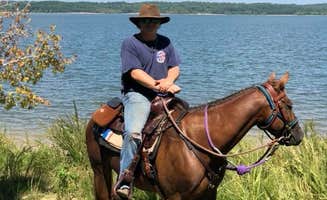Equestrian camping near Batesville, Mississippi offers riders access to established trail systems in the rolling hills of northern Mississippi. The area experiences moderate temperatures most of the year with summer highs reaching 90°F and winter lows occasionally dropping below freezing. Fall camping provides the most comfortable conditions with lower humidity and temperatures ranging from 50-75°F.
What to do
Trail riding opportunities: Fords Well Horse Camp provides well-marked trails that wind through the surrounding woodland terrain. Nancy P. notes, "My friends and I enjoy riding there. Trails are marked and well-maintained."
Water recreation: Plum Point Campground offers access to Sardis Lake with swimming and fishing opportunities during the warmer months. Camper Caleb describes it as a "good spot surrounded by rednecks," indicating a casual, rural atmosphere.
Seasonal activities: The area surrounding Batesville offers seasonal hunting opportunities in designated zones from October through January. Local regulations require proper permits, and campers should verify hunting schedules before planning trail rides during these months.
What campers like
Convenient amenities: Bryant Campground provides basic facilities that equestrian campers appreciate after long rides. As Caleb mentions, the campground has "all basic amenities including shower," making it suitable for multi-day stays.
Peaceful environment: Many campers report minimal crowding at horse camps near Batesville, even during peak riding seasons (April-May and September-October). Weekday visits particularly offer quiet trail experiences with fewer riders.
Accessible terrain: The trails around Batesville feature mostly moderate difficulty ratings suitable for intermediate riders. Most loop trails range from 2-8 miles with minimal steep sections, making them appropriate for various experience levels.
What you should know
Seasonal considerations: Summer camping near Batesville can be challenging due to heat, humidity, and insects. Most experienced campers recommend spring and fall visits when temperatures moderate and biting insects are less prevalent.
Trail conditions: After heavy rainfall, many trails become muddy and occasionally impassable. Fords Well Horse Camp maintains its trails regularly, but riders should check weather forecasts before planning trips, particularly during the rainy spring months.
Reservation requirements: While some sites offer first-come availability, holiday weekends and fall color season (mid-October to early November) can fill quickly. Plum Point Campground requires reservations, which should be made at least 2-3 weeks in advance during peak seasons.
Tips for camping with families
Safety precautions: Parents should note that most horse trails near Batesville lack cell service in certain areas. Trail maps are available at campground offices, and families should establish meeting points before departing on rides.
Beginner-friendly options: For families with younger or less experienced riders, shorter loop trails (2-4 miles) are available near most equestrian campgrounds. These trails typically feature smoother terrain with fewer technical sections.
Extra supplies: The nearest supply stores are located in Batesville, approximately 10-15 miles from most campgrounds. Families camping at Bryant Campground appreciate that "all basic amenities" are available, but should still pack sufficient food, water, and first aid supplies.
Tips from RVers
Hookup availability: RVers report varying levels of hookup access across the region's horse camps. Fords Well provides electric and water hookups suitable for smaller to mid-sized rigs, but lacks sewer connections.
Parking considerations: Most equestrian-friendly sites accommodate trailers, but larger combined rig lengths (over 50 feet) may find limited suitable sites. Arrive early on weekends to secure spots with adequate parking for both RV and horse trailer.
Seasonal road conditions: Unpaved access roads to some equestrian camping areas can become difficult after heavy rain. RVers recommend calling ahead during wet weather to verify road conditions, particularly for heavier rigs accessing more remote horse camps.


